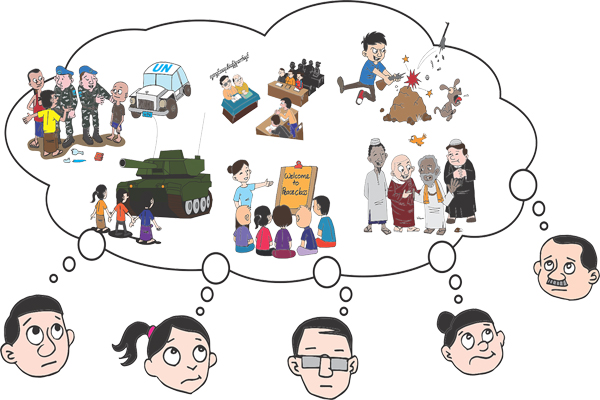In part three of a four-part series on conflict resolution, facilitation experts Toby Berkman and Dan Egol discuss the value of drawing on lived and learned experiences to help achieve a successful resolution.
For facilitators, it is critical to understand the value of both lived and learned experience as elements of identity. Lived experiences are those that can be attained only by having a particular identity or group of identities. Learned experiences are those that can be acquired through practice, opportunity and exposure.
Navigating lived and learned experience
We can offer at least two core principles when it comes to navigating these dual elements of identity. First, both elements have value. Second, the two elements are not equivalent or interchangeable. For example, though both of us have plenty of learned expertise on identity issues and facilitation, the fact that we are both cisgender men (i.e. we identify with our birth gender) means that we cannot be the authority on what it is like to be a woman, trans, or gender non-binary facilitator. Likewise, though Toby identifies as White, he cannot fully understand the economic hardship and health and educational disparities that come with the lives of coal miners from Appalachia. We would be remiss to suggest that our reflections and advice on the topic of facilitator identity could fully take into account the nuances of these lived experiences.
Creating space for both lived and learned experience to surface in facilitation spaces can enable clients and stakeholders to bring their full selves to the engagement and unlock perspectives and solutions that may go otherwise unrecognised. Facilitators should consider when it is appropriate and ethical to draw on both elements of experience; both in the room and when considering which projects to take on.
Contemplating on experiences
When this contemplation of lived and learned experiences (and how they might affect a facilitation) is done effectively, it can play out in surprising ways. For example, Consensus Building Institute’s (CBI) Managing Director David Fairman recalls feeling concerned about his role in facilitating a dialogue in Nigeria related to development strategies. What place did he have as a White American in helping to convene and facilitate this particular dialogue? Was his involvement in fact preventing a similarly skilled Nigerian, with more relevant lived experiences and therefore a deeper understanding of the underlying dynamics at play, from stepping into that space?
To his credit, David raised these concerns explicitly with the client and stakeholders, who assured him that they valued both his expertise as a facilitator and his strong professional network. They wanted him to be involved. He ended up working in close partnership with a highly skilled Nigerian facilitator, ensuring that both lived and learned perspectives were represented in the work.
Creating space for lived experience in dialogues
Lived experience is often explicitly or tacitly minimised (or discarded) in professional spaces, particularly for people belonging to marginalised or underrepresented groups; even when insights derived from that lived experience can enrich facilitated dialogues or processes. For example, Dan openly identifies as a member of the LGBTQIA+ community. As part of this marginalised group, Dan is often the only person from this community in the room (or may think he is because others who do identify as LGBTQIA+ feel uncomfortable or unsafe to disclose that part of themselves at work).
Dan’s experience as a minority based on his sexual orientation shapes how he participates in facilitated processes and at times heightens his awareness of underrepresented voices. At a recent stakeholder meeting on energy and safety, for example, Dan was the only facilitator to name the absence of any First Nations, Indigenous, or Tribal representatives; even though he was the most junior facilitator in the room.

Considering the effect of facilitator lived experience
Lived experience for a facilitator can be a valuable, but at times, two-edged sword. One of CBI’s facilitators grew up on a ranch in a rural part of a US western state. He is therefore often able to relate directly in culture, language, and shared learned experience to farmers, ranchers and fishermen who make their livelihood off the land or at sea. At the same time, does that mean his lived experience potentially biases him against different interests such as environmental activists or recreationists on public land? What about the fact his family ranch sits within the traditional summering grounds of the Ute Tribe?
To return to Toby’s church example (in which Toby’s identity was questioned by members of a church gathered to discuss the pending closure of the church), his learned experience as a professionally trained facilitator suggested he might bring some skill and resources to the table. But his lack of lived experience as a member of the community positioned him as an outsider.
Before the meeting Toby would have done well to consider whether he could credibly lead the process in light of his lived experiences, and to have discussed this openly with the client. Was there someone closer to the problem at hand who could have engaged the community more effectively; or was Toby’s relative distance from the issues in fact an asset? Was his expertise as a process manager valuable enough in this context to justify his involvement? Could there have been some way of featuring his respect for lived experience by partnering or co-facilitating with someone on the ground so that both elements of identity were given equitable space?
Demonstrating competence and good faith
To be clear, we are not suggesting that lived experience is the only kind of valid experience for facilitators, or that we should always take clients’ or stakeholders’ preferences on issues of identity at face value. We believe in taking advantage of opportunities to demonstrate our competence and good faith as facilitators regardless of how similar or different our lived experiences might be from stakeholders’. Some situations may call for simply persevering through a process, demonstrating one’s skill, credibility and trustworthiness by working hard to incorporate diverse voices and acting with integrity. In some instances, it may even be appropriate to respectfully challenge a stakeholder’s or client’s preconceptions around the need for certain facilitator lived experiences.
For example, when clients in cultures with typically strong, historic expectations of male dominance and female subordination have expressed a preference for a male facilitator, CBI has insisted that its women practitioners are eminently capable of managing complex dispute processes, even in cultural contexts that may be resistant to recognising women in leadership roles. Uncomfortable? Yes. Putting forth our values in a non-neutral way? Yes. Essential in advancing what we believe to be better practice and good process? Absolutely.
In part four, and the last part, of this series published next week, we will summarise the key overall lessons for successful conflict resolution. You can also find more information on this topic on the CBI’s website.
ABOUT THE AUTHORS

Toby Berkman is an Senior Associate at the Consensus Building Institute (CBI), where he designs and facilitates inclusive dialogue around difficult public and organisational issues. Dan Egol is Co-Founder and Executive Director of Inclusion NextWork, a community of emerging leaders and organisations committed to Inclusion, Diversity, Equity, Accessibility and Social Justice (IDEAS). Email: tberkman@cbi.org or dan.egol@inclusionnextwork.org.

Check out past guest columns by Berkman & Egol:
INTRODUCTION: Understanding identity through an ‘intersectional’ lens to help achieve successful conflict resolution for both stakeholders and facilitators.
PART 1: Why “understanding identity” is key to successful conflict resolution.
PART 2: Why identity – specifically knowing how to navigate both internal and external perceptions of identity – are key for building trust and an authentic connection for successful conflict resolution.







































